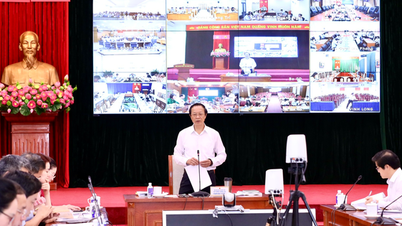In the draft Population Law currently seeking public opinion, the Ministry of Health proposes to allow female workers to extend their maternity leave from 6 months to 7 months when giving birth to their second child.
According to the Ministry of Health, the promulgation of the Population Law creates a unified and synchronous legal basis, contributing to the institutionalization of the Party's guidelines, policies and strategies on population work; Having measures to solve population issues and placing them in an organic relationship with economic , social, defense and security factors, contributing to the country's rapid and sustainable development; Overcoming limitations and shortcomings, meeting the requirements of population work in the new situation.
The Draft Population Law has five basic contents.
Firstly, the Law stipulates the rights and obligations of couples and individuals in giving birth; measures to maintain replacement fertility; allows couples and individuals to decide when to give birth, the number of children and the interval between births (Different from Article 10 of the 2003 Population Ordinance, amended and supplemented in 2008).
Stipulate measures to maintain replacement fertility such as: The Government periodically announces the fertility status so that local authorities can develop and implement appropriate support and incentive policies. In case the fertility rate of some localities drops to a very low level, the Government shall report and propose to the National Assembly timely intervention measures; Allow female workers to extend their maternity leave from 6 months to 7 months when giving birth to their second (two) child (amended Clause 1, Article 139 of the 2019 Labor Code; other cases apply according to current regulations).
Second, the Law stipulates the reduction of gender imbalance at birth and the return of the gender ratio at birth to a natural balance; continues to inherit the provisions prohibiting the act of selecting the gender of the fetus in any form of the Population Ordinance; the Government periodically announces the provinces and cities with gender imbalance at birth at very high, high and natural balance levels.
Third, the law provides policies to adapt to the aging population process.
Building and developing a network of health care for the elderly at home, in the community and in concentrated care facilities; training and fostering human resources for elderly care, including: granting scholarships and tuition support for students majoring in geriatrics; Building training and fostering programs on elderly care; supporting funding for training and fostering for health care staff for the elderly in the community; encouraging organizations and individuals to grant scholarships or subsidies to students; Buying health insurance cards for the elderly who do not have health insurance cards, paid for by the state budget.
Fourth, the law stipulates measures to improve population quality. Measures to implement pre-marital health consultation and examination: Regulates that medical examination and treatment facilities at the grassroots level are responsible for implementing pre-marital health consultation and examination; encourages men and women to implement pre-marital health consultation and examination. Policy beneficiaries, ethnic minority areas, mountainous areas, border areas, islands and people with difficult family circumstances are supported by the State to implement pre-marital health consultation and examination. Regulates diseases that require pre-marital health consultation and examination.
Fifth, the law amends and supplements a number of articles of related laws to ensure consistency such as: Law on Handling of Administrative Violations, Labor Code, Housing Law, Law on Health Insurance.../.
Source: https://www.vietnamplus.vn/de-xuat-tang-thoi-gian-nghi-thai-san-len-7-thang-voi-nguoi-sinh-con-thu-2-post1040883.vnp


































































































Comment (0)